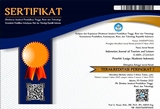Impact of Coffee Tourist Attractions on Visit Intentions of Generation Y and Z
Abstract
Keywords
Full Text:
PDFReferences
Baehaki, F., Nurhamidah, Y., & Purwaeni, P. (2023). Analysis of Caffeine Levels in Packaged Coffee in Indonesia.
Buasin, K., Yamaoka, Y., & Oe, H. (2023). Coffee shops visiting during the pandemic: Moderating effects of process and physical evidence. Global Business and Economics Review, 28(1), 1. https://doi.org/10.1504/GBER.2023.10046445
Candra, S., Pandean, E. T., Harisson, J., & Sutanto, S. (2022). The Impact of Sensory Experience on the Buying Behavior of Coffee Shop Visitors in Indonesia. Journal of International Food & Agribusiness Marketing, 34(2), 214–234. https://doi.org/10.1080/08974438.2022.2043980
Chakraborty, S., Singh, T., Agrawal, D., Irshath, A. A., & Rajan, A. P. (2023). Sustainable Coffee Waste Management Through Circular Economy.
Chen, L. H., Wang, M. J. S., & Morrison, A. M. (2021). Extending the memorable tourism experience model: a study of coffee tourism in Vietnam. British Food Journal. https://doi.org/10.1108/BFJ-08-2020-0748
Chen, S. H., Huang, J., & Tham, A. (2021). A systematic literature review of coffee and tea tourism. International Journal of Culture, Tourism …. https://doi.org/10.1108/IJCTHR-08-2020-0173
Damanik, J., & Weber, H. F. (2006). Perencanaan ekowisata. Yogyakarta: PUSBAR UGM & Andi Yogyakarta.
Dimock, M. (2019, January 17). Defining generations: Where Millennials end and Generation Z begins. Pew Research Center. https://www.pewresearch.org/short-reads/2019/01/17/where-millennials-end-and-generation-z-begins/
Dinis, M. G., Melo, C. S., & Sousa, J. (2021). Coffee tourism in Portugal: an attraction case study. … Journal of Culture, Tourism and …. https://doi.org/10.1108/IJCTHR-08-2020-0194
Gökcen, B. B., & Şanlier, N. (2019). Coffee consumption and disease correlations. Critical Reviews in Food Science and Nutrition, 59(2), 336–348. https://doi.org/10.1080/10408398.2017.1369391
Hennessey, S. M., Yun, D., & MacDonald, R. (2016). Determinants of Travel Intentions to a Neighboring Destination.
Holloway, J. C., & Humphreys, C. (2016). The Business of Tourism (10th ed.). Pearson Education.
Huang, H.-C., Chang, Y.-T., Yeh, C.-Y., & Liao, C.-W. (2014). Promote the price promotion. International Journal of Contemporary Hospitality Management, 26(7), 1065–1082. https://doi.org/10.1108/IJCHM-05-2013-0204
ICO. (2022). Coffee production worldwide in 2020, by leading country (in 1,000 60 kilogram bags)*. https://www-statista-com.ezproxy.ugm.ac.id/statistics/277137/world-coffee-production-by-leading-countries/
ICO. (2023). Coffee production worldwide from 2003/04 to 2021/22 (in million 60 kilogram bags)*. https://www-statista-com.ezproxy.ugm.ac.id/statistics/263311/worldwide-production-of-coffee/
Ismoyowati, D., Wuryandani, S., & Wijayanti, F. K. (2023). Millennials’ Consumer Behavior in the Coffee Agroindustry: The Effect of Consumer Attitudes on Purchasing Decisions. AgriTECH, 43(1), 56. https://doi.org/10.22146/agritech.66577
Kim, D., & Jang, S. (Shawn). (2017). Symbolic Consumption in Upscale Cafés. Journal of Hospitality & Tourism Research, 41(2), 154–179. https://doi.org/10.1177/1096348014525633
Lestari, F. A., & Rosiana, N. (2023). Kinerja Bauran Pemasaran Penalama Coffee &Amp; Talk Di Kota Bogor Berdasarkan Persepsi Konsumen. Jurnal Agribisnis Terpadu, 16(1), 39. https://doi.org/10.33512/jat.v16i1.20160
Luo, J. M., & Lam, C. F. (2020). Travel Anxiety, Risk Attitude and Travel Intentions towards “Travel Bubble” Destinations in Hong Kong: Effect of the Fear of COVID-19. International Journal of Environmental Research and Public Health, 17(21), 7859. https://doi.org/10.3390/ijerph17217859
Madhyamapurush, W. (2022). Research on factors affecting tourist involvement in coffee tourism after the COVID-19 pandemic in Thailand. F1000Research. https://f1000research.com/articles/11-1269
Madhyamapurush, W. (2023). Analysis on factors affecting tourist involvement in coffee tourism after the COVID-19 pandemic in Thailand. F1000Research, 11, 1269. https://doi.org/10.12688/f1000research.123759.2
Nguyen, H. M., Phuc, H. N., & Tam, D. T. (2023). Travel intention determinants during COVID-19: The role of trust in government performance. Journal of Innovation & Knowledge, 8(2), 100341. https://doi.org/10.1016/j.jik.2023.100341
Shahbandeh, M. (2022). Coffee production worldwide from 2003/04 to 2020/2021 (in million 60 kilogram bags) .
Sugiyono. (2020). Metode penelitian pariwisata (kuantitatif, kualitatif dan R&D) (N. Yuniati, Ed.; 1st ed., Vol. 1). Alfabeta.
Suhud, U., Allan, M., & Gaffar, V. (2022). Antecedents of Tourists’ Intentions to Visit in the Context of Coffee Tourism. … Management &Tourism. https://search.proquest.com/openview/713763b3e8a0ab33d21a6c9949530602/1?pq-origsite=gscholar&cbl=466419
Sunarharum, W. B., Ali, D. Y., Mahatmanto, T., Nugroho, P. I., Asih, N. E., Mahardika, A. P., & Geofani, I. (2021). The Indonesian coffee consumers perception on coffee quality and the effect on consumption behavior. IOP Conference Series: Earth and Environmental Science, 733(1), 012093. https://doi.org/10.1088/1755-1315/733/1/012093
Teles, C. R. A., & Behrens, J. H. (2020). The waves of coffee and the emergence of the new Brazilian consumer. In Coffee consumption and industry strategies in Brazil (pp. 257–274). Elsevier.
Tu, R., Park, S. K., & Ding, Y. (2023). Travel intentions of travelers in the COVID-19 context: The moderation of fear of COVID-19. Frontiers in Psychology, 14. https://doi.org/10.3389/fpsyg.2023.1136465
Tucker, C. M. (2017). Coffee Culture, History, and Media in Coca-Cola Land. In Coffee Culture Local Experience, Global Connections (2nd ed., pp. 18–25). Routledge.
Weidenfeld, A., Butler, R., & Williams, A. M. (2016). Visitor Attractions and Events: Locations and linkages.
Yeap, J. A. L., Ooi, S. K., Ara, H., & Said, M. F. (2021). Have coffee/tea, will travel: assessing the inclination towards sustainable coffee and tea tourism among the green generations. International Journal of Culture, Tourism and Hospitality Research, 15(3), 384–398. https://doi.org/10.1108/IJCTHR-08-2020-0191
Yun, D., MacDonald, R. M., MacEachern, M., & Hennessey, S. (2007). Travel intentions to a major Canadian Tourist destination: the results of a web-based survey. Canadian Journal of Marketing Research, 24(1), 53–63.
DOI: https://doi.org/10.36256/ijtl.v5i2.434
Refbacks
- There are currently no refbacks.
Copyright (c) 2024 Indonesian Journal of Tourism and Leisure

This work is licensed under a Creative Commons Attribution-NonCommercial-ShareAlike 4.0 International License.
Indonesian Journal of Tourism and Leisure Indexed and Archieved By:

Indonesian Journal of Tourism and Leisure is licensed under a Creative Commons Attribution-NonCommercial-ShareAlike 4.0 International License.













